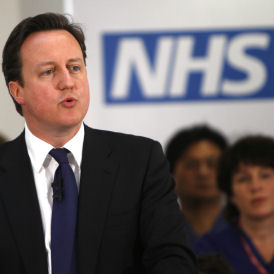Cameron: ‘We save the NHS by changing it’
Prime Minister David Cameron signals his determination to go ahead with reforms to the NHS – but there could be major changes and plenty of politics still ahead, a health expert tells Channel 4 News.

Prime Minister David Cameron backed the concept of reform in a speech at a London hospital – but he did not give much more detail of what elements of the NHS reform plan could be changed as a result of a “listening exercise” the Government has conducted with health professionals.
However the PM did suggest that the next steps for NHS reform would be in June, when the Government responds to the NHS Future Forum’s report on the reforms at the end of the “listening exercise”.
He said: “We save the NHS by changing it. We risk its long-term future by resisting change now.
“I know that some people still have concerns. They might be listening to this and thinking: ‘OK, but if you love the NHS so much, if you don’t want to take any risks with it, why do you want to change it?
It’s because I love the NHS so much that I want to change it. Prime Minister David Cameron
“But this is the point: it’s because I love the NHS so much that I want to change it. It needs to change to make it work better today and it needs to change to avoid a crisis tomorrow.”
Controversial
The Coalition’s plans to reform the NHS have proved controversial, with critics fearing increased competition and the destruction of key services. A poll released on Monday by nhsManagers.net showed that 94 per cent of NHS managers believed the reforms were “irrelevant” and “dangerous”.
Political Editor Gary Gibbon blogs:
This speech was about selling the overall idea of NHS reform and convincing people he's not introducing a rampant unrestrained market.
Read more: I love the NHS, says Cameron
And there has been political hostility to the reforms as well. In a sign of tensions within Government over the changes, Deputy Prime Minister Nick Clegg has signalled his party would block the reforms unless major revisions were made. The reforms are currently “on pause” while the Government consults further on the changes.
Click on the image above to read more from Channel 4 News on the NHS reforms
Mr Cameron said that the “raised passions” in the debate over the Health and Social Care Bill proved only that the NHS “is the most important thing to Britain’s families” and that he was right to make it his top priority.
He said that the “resounding message” from the patients, doctors and nurses he had met during the listening exercise was: “Yes, we love the NHS but yes, there are some real problems.”
But health policy expert Professor Kieran Walshe, from Manchester Business School, told Channel 4 News the speech was an odd one at this stage in the process.
“It was the kind of speech politicians usually give before they begin a change programme,” he said.
“Three quarters of the speech made the case for change, but it was only a partial argument – it did not take into account that waiting times are the lowest we’ve ever had, patient satisfaction is highest, health outcomes are improving rapidly, the NHS does well in international surveys and remains one of the cheapest health services.”
Funding gap
The Prime Minister said sticking with the status quo was “not an option”.
“Sticking with the status quo and hoping we can get by with a bit more money is simply not an option…There’s only one option we’ve got and that is to change and modernise the NHS, to make it more efficient and more effective – and above all, more focused on prevention, on health, not just sickness,” he said.
“We save the NHS by changing it. We risk its long-term future by resisting change now.”
David Cameron’s strategy has been to defend the Health Secretary, but I am not sure how long that will last. Professor Kieran Walshe
But Professor Walshe told Channel 4 News he expected one of two scenarios come June, when the NHS “listening exercise” ends.
“David Cameron’s strategy has been to defend the Health Secretary, but I am not sure how long that will last,” he said.
“There are two scenarios. One, the Government bites the bullet, tears important parts of the Bill out, and responds. I am not sure Andrew Lansley would have the heart to do this, he could leave, and a change of Health Secretary could show a commitment to change. If they did this, the Bill could go through.
“But the more likely scenario is there are minor changes on a different timescale, and they will hope that is enough. Whether the Bill then goes through is up to the Lib Dems, and their role in the Coalition. It’s all about politics,” he said.
